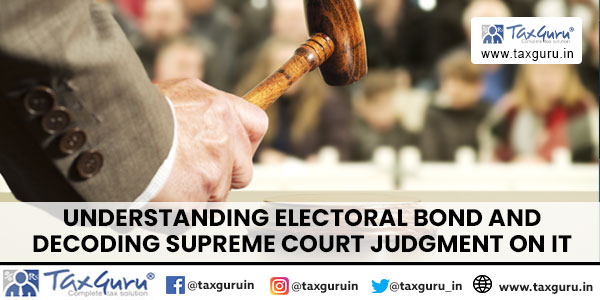The Indian government introduced the electoral bond scheme in the union budget 2017-18, with the aim of replacing case donations and improving transparency in political funding. This scheme aims to curb the influence of black money in politics.
1. WHAT IS THE ELECTORAL BOND SCHEME:
Electoral bonds in India are financial instruments that function as promissory notes or bearer bonds. These bonds can be bought by Indian citizen or entity incorporated in the country from the authorised branches of state bank of India and are exclusively issued for the purpose of contributing funds to political parties. Under this scheme, electoral bond are issued in multiples of Rs 1000, Rs 10,000, Rs 1 lakh, Rs 1 crore.
This Bonds are available for 10- days each in January, April, July and October. The 10- day periods is announced by the Centre. The Centre can specify an additional 30day period in a general election year. Under this scheme only the political party registered under section 29A of the Representation Of People Act, 1951 and which secured not less than 1 percent of the votes pooled in the last elections to the Lok Sabha or a state legislative assembly are eligible to encash the electoral bonds. According to the scheme, the proceeds from any bonds, which are not enchased within 15 days of being issued, are to be deposited in the prime minster relief fund.
Under this scheme the name and other information of the donor are not entered on the instrument are thus the electoral bond are said to be anonymous there is no cap on the number of electoral bond that a person or company can purchase
2. Why were electoral bonds introduced:
Electoral bonds were introduced to bring transparency to political funding in India. They promote transparency since political parties receive donations through formal banking channels that are audited by the government authorities. the identity of the donors is anonymous and remains confidential, thus reducing the risk of intimidation or retaliation for their political affiliations.
The concept behind the introduction of electoral bonds was to reduce black money in politics and to provide transparent and legal mechanism for individuals and entities to contribute to Political parties. They serve as a means for donors of the bond to make donations to registered Political parties while maintaining anonymity.

3. Tax benefit under electoral bond:
Under the Income Tax Act, electoral bond donations are considered to be tax exempt under section 80GG and section 80 GGB the political party receiving donation under electoral bond can also receive donation as per the income tax act’s section 13A
4. Supreme court judgement on electoral bond :
The five-judge constitution bench of the supreme court comprising of chief justice D.Y. Chandrachud, justices B.R. Gavai, J.B. Pardiwala and Manoj Misra, justice Sanjiv Khana on February 15 2024 day Thursday delivered its highly – anticipated judgement in the electoral bond case. Holding that anonymous electoral bond are violative of the right of information under article 19(1)(a) of the constitution. accordingly the scheme has been struck down as unconstitutional.
Two opinions were written in the 232 page judgement. D.Y. Chandrachud, writing for justices Gavai, Pardiwala, Misra authored 158 pages. And Sanjeev Khana wrote 74 page concurring opinion
The chief justice of India DY Chandrachud on the electoral bond scheme said financial support via the electoral bonds to Political parties can lead to quid PRO Quo arrangement. The electoral bonds scheme is not only the means to curv the black money. there are other alternatives.
The constitutional bench issued the following direction –
1. The issuing bank shall here with stop the issuance of electoral bonds
2. SBI shall submit details of the electoral bonds purchased since the interim order of this court dates 12 April 2019 till date to the ECI.
3. SBI shall submit the details of political parties which have received contribution through electoral bonds since the interim order of this court date 12 April 2019 till date to the ECI.
4. SBI Is required to submit the above information to the ECI within 3 week.
5. The ECI will submit the above information shared by the SBI on its official website within one week.
6. Electoral bonds which are within the validity period of fifteen days but has not enchased shall be returned by the issuing bank who shall refund the amount to the purchaser’s account the justice Sanjiv khana expressed the similar opinion on the electoral bonds declaring it as unconstitutional ..
Conclusion:
Overall, while electoral bonds have brought some degree of formalization to political funding in India, their impact on transparency, accountability, and the democratic process remains a subject of intense debate and scrutiny.





